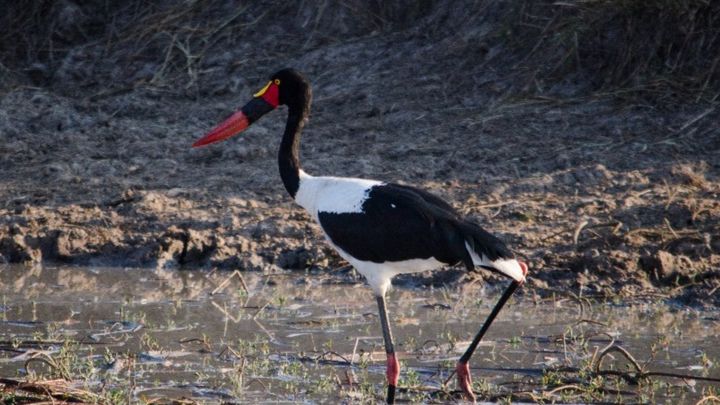
Conserving wetland birds in Africa
Donation protected
Wetlands are of significant value to both humans and wildlife, yet these ecosystems in Africa have experienced drastic degradation due to overfishing, habitat alteration, damming of rivers, and more. The negative impacts of this degradation is currently affecting economies in Africa as well as wildlife populations. Unfortunately, most habitat conservation in Africa has been concerned with establishing national parks to protect large mammal populations, such as elephants and lions. Wetlands, on the other hand, have been largely neglected in the realm of landscape conservation. Across southern Africa, in particular, wetlands, lakes, and rivers form complex networks of aquatic habitat for a variety of wildlife, especially a diversity of waterbirds.
The Saddlebill is Africa's tallest and most striking stork species, yet it has never been studied. In reality, without scientific data on the species, an accurate assessment of its population status cannot be made, so it is unclear if it is a threatened or not. Upon learning this, I realized it is important to learn more about the Saddlebill in order to conserve the species. I also realized the Saddlebill is a perfect model species to test the health and connectivity of wetlands in southern Africa. By initiating the first ever study of the Saddlebill, we can determine if its population is declining and if wetlands in southern Africa are connected enough for young storks to disperse to their own territories when they leave their parents. The implications of this study go beyond Saddlebills and have the potential to impact other wetland birds, too; it also can change the way conservationists approach landscape conservation in Africa.
The project I'm proposing will involve fitting satellite tags on juvenile Saddlebills in Kafue and Liuwa Plains National Parks in Zambia. By using satellite tags, we can track juveniles as they become independent and move to new areas. The data collected from these tags will show if storks are using wetlands in unprotected areas and how these areas are connected to national parks.
Our goal is to raise $6,000 USD to help fund stipends and food for field staff during the fieldwork in Zambia next summer. Your contributions can help make this novel research successful and put an emphasis on the importance of wetland and waterbird research and conservation. Please share with others and let them know how important wetlands are to us and wildlife!
The Saddlebill is Africa's tallest and most striking stork species, yet it has never been studied. In reality, without scientific data on the species, an accurate assessment of its population status cannot be made, so it is unclear if it is a threatened or not. Upon learning this, I realized it is important to learn more about the Saddlebill in order to conserve the species. I also realized the Saddlebill is a perfect model species to test the health and connectivity of wetlands in southern Africa. By initiating the first ever study of the Saddlebill, we can determine if its population is declining and if wetlands in southern Africa are connected enough for young storks to disperse to their own territories when they leave their parents. The implications of this study go beyond Saddlebills and have the potential to impact other wetland birds, too; it also can change the way conservationists approach landscape conservation in Africa.
The project I'm proposing will involve fitting satellite tags on juvenile Saddlebills in Kafue and Liuwa Plains National Parks in Zambia. By using satellite tags, we can track juveniles as they become independent and move to new areas. The data collected from these tags will show if storks are using wetlands in unprotected areas and how these areas are connected to national parks.
Our goal is to raise $6,000 USD to help fund stipends and food for field staff during the fieldwork in Zambia next summer. Your contributions can help make this novel research successful and put an emphasis on the importance of wetland and waterbird research and conservation. Please share with others and let them know how important wetlands are to us and wildlife!
Organizer
Jonah Gula
Organizer
San Marcos, TX